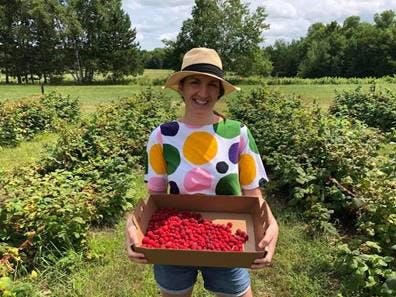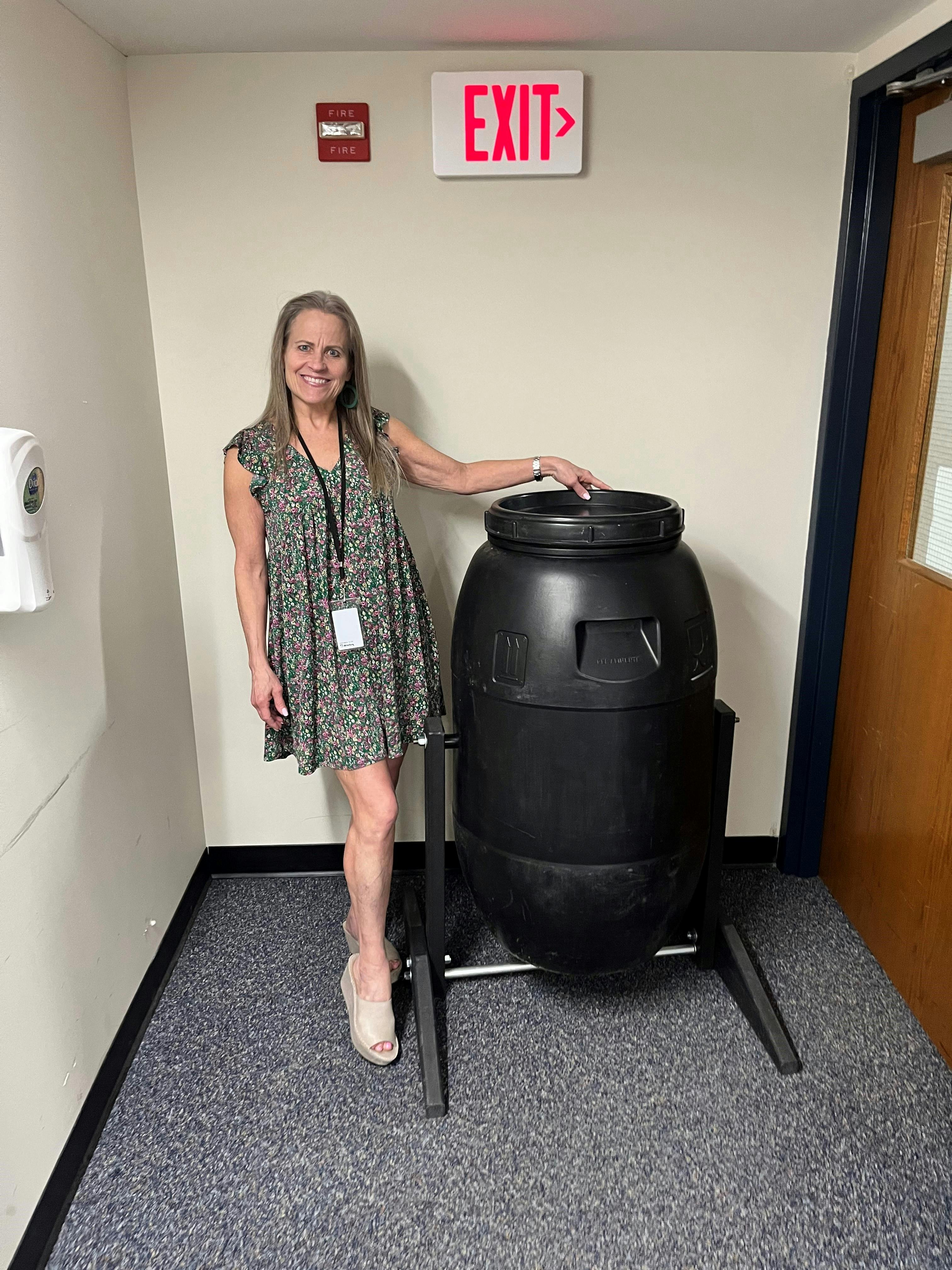Frog Town Green: September 18 Workshop

Welcome to the City of Saint Paul's Garbage Program Composting 101 group site. This is a dedicated discussion space for Saint Paul residents that attended one of the four Composting 101 Workshops. This resource was created to be the location to ask a question, submit your weekly food weights, and find information about Composting.
We want this discussion page to be a place where neighbors support each other, share their success, and work towards achieving success with composting.
- News Check here for articles and events related to composting and food waste reduction.
- Forum Not sure what to do with those leftover French fries? Ask your team for suggestions. On this page you can chat with others and share composting tips. City staff will monitor these questions and share them in the FAQ section.
- Stories. Share your Success! We want to celebrate our small victories. Share your composting and food waste reduction related photos with your team.
- Survey Respond to surveys posted by the City.
If you have any questions, please email Clare or Sue. You can find their contact information under the Who's Listening section.
Welcome to the City of Saint Paul's Garbage Program Composting 101 group site. This is a dedicated discussion space for Saint Paul residents that attended one of the four Composting 101 Workshops. This resource was created to be the location to ask a question, submit your weekly food weights, and find information about Composting.
We want this discussion page to be a place where neighbors support each other, share their success, and work towards achieving success with composting.
- News Check here for articles and events related to composting and food waste reduction.
- Forum Not sure what to do with those leftover French fries? Ask your team for suggestions. On this page you can chat with others and share composting tips. City staff will monitor these questions and share them in the FAQ section.
- Stories. Share your Success! We want to celebrate our small victories. Share your composting and food waste reduction related photos with your team.
- Survey Respond to surveys posted by the City.
If you have any questions, please email Clare or Sue. You can find their contact information under the Who's Listening section.
-
U of MN Extension: Composting in Home Gardens
Share U of MN Extension: Composting in Home Gardens on Facebook Share U of MN Extension: Composting in Home Gardens on Twitter Share U of MN Extension: Composting in Home Gardens on Linkedin Email U of MN Extension: Composting in Home Gardens link
Looking for more resources on backyard composting? We love the work the U of MN has done on this topic
Thank you for your contribution!
Help us reach out to more people in the community
Share this with family and friends
No thanks -
Tips and Tricks to Composting
Share Tips and Tricks to Composting on Facebook Share Tips and Tricks to Composting on Twitter Share Tips and Tricks to Composting on Linkedin Email Tips and Tricks to Composting link We are so excited as your own compost bin comes together! Here are some tips and tricks we have for you as the weeks go by!
We are so excited as your own compost bin comes together! Here are some tips and tricks we have for you as the weeks go by!Tip #1: Make sure you balance your greens and browns!
Having too many greens in your mixture can slow down the decomposition process along with effect the texture of your compost! Remember the correct ratio for your compost bin (3:1 for cedar bins and 1:1 for tumbler bins)!
Tip #2: Keep your compost moist!
If your compost is too dry, it will take longer to decompose. Remember to water your compost and keep it moist like a wrung-out sponge!
Tip #3: Keep it small!
Sometimes having big chucks of greens and browns can cause the decomposition process to slow down. It can help by cutting your food scraps into smaller pieces, breaking down your plants/weeds, and shredding paper before adding it into your cedar/tumbler.
For more tips and tricks on composting, check out this news article about more efficient and fun ways to get familiar with your compost bin. Click Here for more tips and tricks!
Have some tips to share with other participants? Leave a comment below and let us know.
Thank you for your contribution!
Help us reach out to more people in the community
Share this with family and friends
No thanks -
Finding Browns
Share Finding Browns on Facebook Share Finding Browns on Twitter Share Finding Browns on Linkedin Email Finding Browns linkHaving trouble finding browns or running out of browns quickly?
Here are some back up items and tricks to having a constant pile of browns for your compost bin!

First off, what are browns? Browns are any dry, plant, or woody material, they are usually brown or will turn brown naturally. Not all browns are natural or nature based.
Here are examples of some common browns used for composting:
- Fall leaves
- Pine needles
- Straw or Hay
- Paper (newspaper, coffee filters, napkins)
- Lawn clippings (dried out)
Alternatives for natural brown materials:
- Cardboard (egg cartons)
- Paper towels
- Toilet paper
Accidently recycle all your cardboard? Have no more leaves? Just used the last of your browns? Don't worry, you always have something laying around somewhere in your house. Here are some alternatives that you probably don't even know can be use in your compost bin:
- Dryer lint
- Coffee filters
- Junk mail
- Toilet paper rolls
- Paper (shredded)
See any that aren't on the list? Comment below or let us know in the forum.
Thank you for your contribution!
Help us reach out to more people in the community
Share this with family and friends
No thanks -
Composting in Winter
Share Composting in Winter on Facebook Share Composting in Winter on Twitter Share Composting in Winter on Linkedin Email Composting in Winter link As the weather turns colder, you may wonder “Can I still compost in Winter?”
As the weather turns colder, you may wonder “Can I still compost in Winter?” The answer is yes, but the cold temperatures can affect your compost pile. The bacteria which help us turn our yard waste into soil slowdown in the winter. However, if your compost pile is large and deep enough the composting process will continue under the ice and snow where the bacterial process heats up pile from the bottom up. The outer layers of compost may freeze and not break down at all if temperatures reach freezing or below, but the inner layers will remain active.
To add to your compost, you would break through the outer layers and add new material to the inside of the pile. Be careful not to add invasive material as the winter composting process doesn’t heat up enough to kill the seeds that can spread these unwanted plants. Make sure to add all those fall leaves to your pile and if you are able, break the materials you add into smaller pieces, so they break down faster. If it is too cold to go out and turn your compost, you can wait until the weather warms up to turn the pile.
-
Diagnosing Common Backyard Composting Problems
Share Diagnosing Common Backyard Composting Problems on Facebook Share Diagnosing Common Backyard Composting Problems on Twitter Share Diagnosing Common Backyard Composting Problems on Linkedin Email Diagnosing Common Backyard Composting Problems link Does your compost pile smell? Is it taking a while to break down? Here are some solutions to these and other composting problems:
Does your compost pile smell? Is it taking a while to break down? Here are some solutions to these and other composting problems:My Compost Smells Like Rotten Eggs:
This is usually due to lack of air and an excess of moisture in the pile. To solve this issue, turn the pile to add air and to dry out. You can also add some more bulky brown materials to increase the amount of air space in the compost pile.
My Compost Smells Like Ammonia:
Excess nitrogen from green composting materials can cause an ammonia smell. To solve this issue, simply add more brown materials to the compost pile.
My Compost Pile will Not Heat Up
There are many reasons why a compost pile will not heat up. The most common issues are that the pile is either too small or the pile is too dry. In order to heat up, a pile should be a minimum of 3 feet high by 3 feet in circumference. If the pile is too dry, turn the pile to mix materials and add water with a hose or watering container. Then let the pile rest for several hours and test the moisture level again.
My Compost Is Attracting Rodents or Other Animals:
Animals are attracted to compost piles by any materials that they see as food. Therefore, do not add materials such as bones, meats, oils, fats, or foods cooked in oil/fats, and dairy products. It's also a good idea to bury any kitchen scraps beneath several inches of brown materials such as leaves.
Are you having any issues with your compost so far? If so, post them below or in the Forum Section and we can help provide solutions.
Thank you for your contribution!
Help us reach out to more people in the community
Share this with family and friends
No thanks -
How to Use Your Compost
Share How to Use Your Compost on Facebook Share How to Use Your Compost on Twitter Share How to Use Your Compost on Linkedin Email How to Use Your Compost link
Most of the content that we have provided has focused on how to create compost, but what are you supposed to do with it once you are done? We have you covered. Below are several ways that you can use your finished compost to grow strong and healthy plants.
Incorporate compost into your new gardens.
Add and incorporate 1-2 inches of mature compost in the top 6-8 inches of soil.
Use compost to improve your seedling starts.
Screened compost reduces soil crusting and allows easier seed emergence. Microbes in compost also act to reduce pathogen activity and develop stronger seedlings.
Use compost to “refresh” your potted plants.
Adding 1/4 to 1/3 compost to your potting mix will aid in moisture retention, avoid crusting and improve aeration.
How are you planning on using your compost? Please comment below.
Thank you for your contribution!
Help us reach out to more people in the community
Share this with family and friends
No thanks
Key Dates
-
September 21 2022
-
September 25 2022
-
October 05 2022
-
October 12 2022
-
October 19 2022





